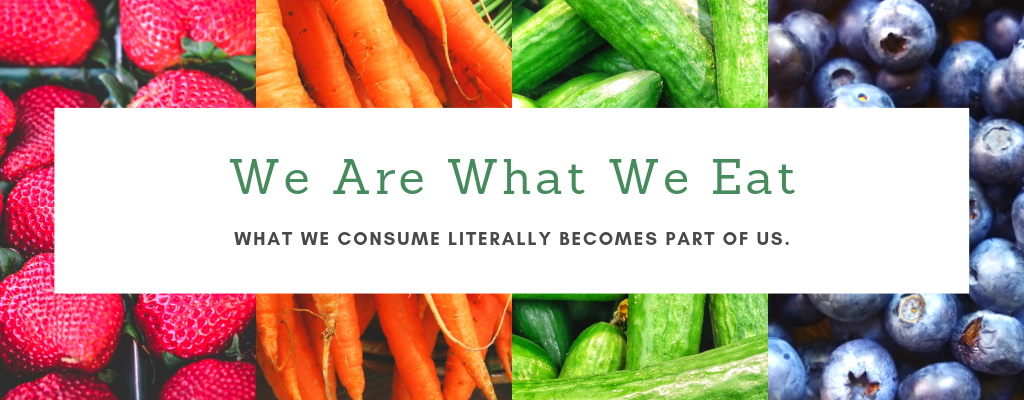We Are What We Eat

"You are what you eat." How many times have we heard that saying? Often, it's said to discourage us from over-indulging in sweets and what we generally call "junk food." A more accurate expression, however, would be, "You are what you digest." What we consume literally becomes part of us. The nutrients in a banana assimilate into our bodies, and we excrete what we cannot use.
Yes: what we eat (and digest) becomes us.
Toxins
Our air, water, and soil today are, more often than not ,highly toxic. Take glyphosate, for example. Our dear friend Dr. Zach Bush and best selling author Jeffrey Smith are both advocates for change! Dr. Zach Bush, M.D. explains the problem in detail:
“The most widely used commercial pesticide is a glyphosate-based herbicide, called Roundup. Today, Roundup’s use is so profuse, that it has become impossible to avoid the effects altogether. In fact, 99.99% of Roundup never even hits a weed – instead, it’s found primarily in the runoff, and ends up in the water we drink and the air we breathe. In the southern United States, 75% of the air and the rain are contaminated with glyphosates.
Glyphosate damages the gut lining by suppressing it of oxygen (this is called a hypoxic injury). One of the results of this, is the over expression of CXCR3, a receptor to the gluten compound . Once this happens, gluten is broken down, and produces something called zonulin. Zonulin opens up the tight junctions of the gut, and then you get an “unzippering” of the whole gut lining and now you have leaky gut.
We’ve been able to have gluten in our diet for thousands of years without any measurable immune impact. Suddenly in the 1990s, 15-20% of the American population became gluten sensitive. Now, about 50-60% of the U.S. population has some form of gluten sensitivity.”
In a nutshell, glyphosate affects everything: who and what we are, the air we breathe, the water we drink and bathe in, our health, and the food we eat. Avoiding it altogether is impossible. But, we can minimize our exposure by making wise life choices.

Frankenfood
Unfortunately, it gets worse. The denaturing of wheat leads to the problem of GMO's (genetically modified organisms). They are essentially "Roundup-ready" crops, able to withstand the denaturing effect of glyphosate.
GMO's are everywhere. Toxins, like glyphosate, get sprayed on them, compounding the problem of genetic modification. It's a vicious and highly toxic circle. Together, pesticides like glyphosate and GMO's present a serious challenge to human biology.
This brings us back to the importance of farming. We need healthy soil, worked according to age-old practices like composting and crop rotation, which allow the land to recover and remineralize between growing seasons.
The late Pope John Paul II put it bluntly: "The earth will not continue to offer its harvest, except with faithful stewardship. We cannot say we love the land and then take steps to destroy it for use by future generations." You may not be able to eat completely organic food but it’s within your power to do something - pot a lemon tree for your patio, or grow an herb garden in your kitchen window. In the process, you're making yourself part of the solution!
Closing Thoughts
There is a Native American saying - "We do not inherit the earth from our ancestors, we borrow it from our children." We need to ask ourselves what we are doing with this "borrowed treasure" that is our planet! In what condition will we return it to our children and grandchildren? And, if we're eating food contaminated with glyphosate and denatured by genetic modification, the million dollar question is this: What are we becoming?

- Melody Besner



